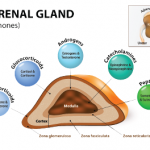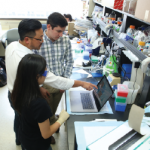The ACR and RheumPAC are working to secure an annual allocation of $20 million dedicated to research on arthritis prevention and treatment in the Congressionally Directed Medical Research Program budget.

RheumPAC Advocates for Dept. of Defense Arthritis Research Funding
RheumPAC is the ACR’s non-partisan political action committee, which promotes the needs of rheumatology providers and patients. Advocacy efforts often focus on legislation to improve the day-to-day clinical care of rheumatology patients, such as establishing clinical exceptions to step therapy requirements and reforming the prior authorization process. In addition, the ACR and RheumPAC recognize the…

The Tortured Path to the Cortisone Discovery
CHICAGO—The path to the discovery of cortisone—a top-selling, important drug, with dozens of indications—was complicated by failure, false moves, desperation and obsession. The tale, recounted in the Philip Hench, MD, Memorial Lecture: Crossroads of History & Hope: Discovery & First Use of Cortisone for RA at the 2018 ACR/ARHP Annual Meeting in October, is an…

The Non-Linear Path of Discovery, & Publicly Funded Research
Black powder was initially developed in 9th century China, by Taoists searching for the philosopher’s stone, which fans of Harry Potter will remember is the talisman that grants eternal life. The Chinese name for black powder literally translates as fire medicine. The chemical composition of black powder was first recorded in China during the 11th…

Rheumatology Research Foundation Announces Grant Recipients
On July 1, the Rheumatology Research Foundation awarded grants to a wide range of rheumatology trainees and professionals. The recipients will receive funding for essential education and training, as well as innovative research projects. Their applications were closely examined by experts in different areas of the field to ensure awards went to the most promising…

Funding Available for Community Practitioners from the Rheumatology Research Foundation
Few opportunities exist for rheumatologists in community-based practice who, in addition to taking care of patients, want to test their own observations through research. Limited funding, time constraints and competition from larger academic medical centers are some of the barriers hindering clinical research in this setting. The Rheumatology Research Foundation is addressing this issue with…
ACR Offers Hands-On 101 Course in Advocacy
The ACR’s Advocacy 101 course will be held Sept. 24 in Washington, D.C. The course is an interactive, intensive, full-day opportunity for fellows in training and program directors to learn about and become inspired to advocate for the continued strength of rheumatology recruitment and support for education, research and clinical practice. Course applications will be…
GSK, Astra, J&J Link with Universities in New Drug Research Fund
LONDON (Reuters)—GlaxoSmithKline, AstraZeneca and Johnson & Johnson have joined with three leading British universities to create a new 40 million pounds ($57 million) fund backing early drug research. The Apollo Therapeutics Fund, which aims to improve the speed and potential of university research being translated into new medicines, is a further example of a trend…
U.S. House Passes Bill to Speed New Drugs to Market
WASHINGTON (Reuters)—The U.S. House of Representatives on Friday passed a bill aimed at speeding new drugs to the market after lawmakers defeated last-minute amendments that threatened to derail it. The House voted 344 to 77 in favor of the bill, known as the 21st Century Cures Act, which would require the FDA to streamline the…
Tight NIH Budget Makes Research Careers Tough
Lack of research funding a challenge for researchers, especially those early in their careers. (posted June 13, 2013)